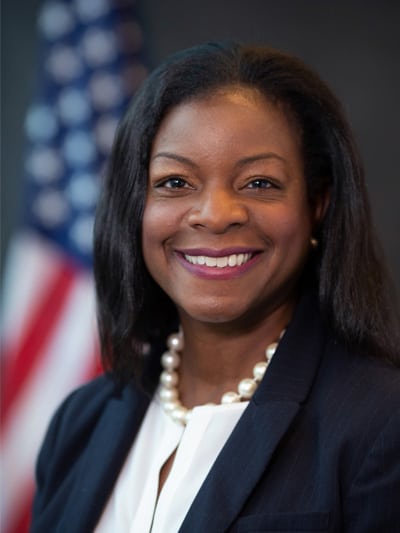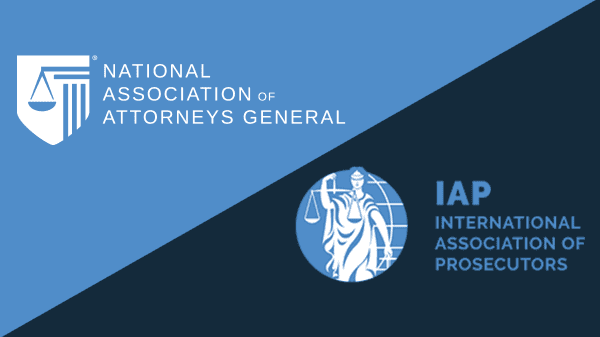Jeanette Manning, NAGTRI Program Counsel
Since 2011, the National Attorneys General Training and Research Institute (NAGTRI) has hosted an annual International Fellows (IF) program, where a group of remarkable international and domestic government attorneys have the opportunity to work collaboratively on critically important global legal issues. They have jointly worked on these issues while also meeting and interacting with experts in the field. I admit that I am especially partial to this program because I was fortunate enough to be selected as a participant in the initial IF class while working on human trafficking issues at the District of Columbia Attorney General’s Office. Since joining NAGTRI in 2013, I have had the great fortune to assist with organizing the fellows program and meeting amazing, highly-knowledgeable, interesting, and qualified practitioners, prosecutors, and assistant attorneys general from around the world. The IF program is unlike any other NAGTRI training, and I highly encourage attorneys from the state and territorial attorneys general offices to check the NAAG website in early 2017 for the IF announcement and apply to participate in the program.
Undeniably, NAGTRI provides ample, highly-substantive training opportunities enabling the attorney general community to improve their craft, but the IF program is unique. Attorneys are given the opportunity to participate in very diverse activities during their intensive, week-long agenda. Each program is focused on one substantive issue. The fellows hear from experts in the field in that area, work on a group paper addressing a topic within that issue, and meet with senior level officials from the government and non-governmental organizations. Empowering attorneys to improve their job performances is one of the major objectives for hosting the International Fellows program. To assist the fellows in accomplishing this goal, as part of the program, the U.S. attorney general has graciously met with them to discuss ways to tackle the issue they are exploring. The fellows travel to the Capitol to meet with a senator and continue to the U.S. Supreme Court to hear an instructive and inside-the-Court briefing provided by the clerk of the court. At the end of the week, the fellows present their papers, incorporating their collective thoughts, experiences, legal systems, and proposals before an esteemed panel at the New York University School of Law.
We at NAGTRI, assisted by members of the NAGTRI Advisory Board, spend the time each year to thoroughly review each application from both our international prosecutors as well as the applicants from the state attorneys general offices. We try to ensure that the fellows selected for the program are as ethnically and regionally diverse as possible. We have been fortunate enough to host fellows from all but one continent, from the smallest island nations to large, developed countries and from tribal, civil, and common law traditions.
However, the major highlight for me is watching the fellows develop long-term friendships with people they ordinarily would not have had the opportunity to meet. I had a similar experience as a fellow, and, to this day, I maintain contact with people I met in my class. Each year, NAGTRI produces an IF newsletter where fellows share updates on their professional and personal lives and have described how impactful the program has been. Upon returning home, many have implemented systemic changes in their offices or developed new strategies to handle their cases differently based upon information they received during the program and the professional contacts they made.
With this issue of the Journal focusing on NAAG’s involvement in the international prosecutor community, I would like to introduce you to each class since the 2011 inception of the IF program.
The IF program for the 2016 class will include 25 attorneys from very diverse locations around the globe. This year’s theme is entitled, “The Prosecutor’s Role in Fighting Corruption and Promoting Public Integrity.” The attorneys will focus on how best to tackle corruption from its inception and contribute to its reduction globally. In particular, they will explore various aspects of corruption, including dissecting how prosecutors may work with investigators to properly litigate and handle these cases; analyzing and understanding the root causes of corruption; conducting financial investigations; and methods to decrease opportunities for corrupt behavior. The following countries will be represented in this year’s class: Australia, Brazil, Canada, Hungary, Israel, Jordan, Latvia, Mauritius, Mexico, Norway, Somalia, Switzerland, the Netherlands, Uganda, United Kingdom, Vanuatu, and the United States. From the United States, attorneys from Illinois, New York, Ohio, Pennsylvania, Puerto Rico, Rhode Island, and Utah will be participating. It runs June 4-11.
The IF program for the 2015 class included 23 government attorneys. The attorneys focused on community-based prosecution efforts and efforts to reduce crime, entitled specifically, “Innovative Prosecutorial and Crime Fighting Strategies.” As leaders in the criminal justice field, these lawyers explored and offered unique perspectives on how prosecutors can be leaders in crime reduction efforts. In particular, they examined areas involving how prosecutors can work within the community to reduce crime; how specialized investigations and prosecutions can reduce ever-increasing global crime; how government attorneys may assist in lessening recidivism rates following inmate release from prison; and how to enhance public confidence in the judicial system. The following countries were represented in the 2015 class: Australia, Bermuda, Brazil, Canada, Cook Islands, Denmark, El Salvador, Ireland, Mali, Mexico, Nepal, South Africa, Taiwan, Timor-Leste, Uganda, Ukraine, United Kingdom, and the United States. From the United States, attorneys from Arizona, Delaware, Florida, Nebraska, Nevada, and Rhode Island participated.
The IF program for the 2014 class included 18 government attorneys from throughout the globe. The attorneys focused on myriad issues involving a prosecutor’s role in promoting the rule of law. They explored particular areas regarding maintaining the rule of law, such as the role that private enterprise plays and why business compliance while operating in host countries is essential; how prosecutors and defense attorneys can work together and do so in a manner where resources tend to be severely limited; the role that international organizations may play in working directly with prosecutors; and the role of the media in its messaging. The following countries were represented in the 2014 class: Afghanistan, Bosnia and Herzegovina, Brazil, Mexico, Morocco, New Zealand, Philippines, Poland, South Africa, Taiwan, United Kingdom, Zambia, and the United States. From the United States, attorneys from New Mexico, New York, Oklahoma, South Carolina, Virginia, and West Virginia participated.
The IF program for the 2013 class included 21 government attorneys from throughout the globe. The attorneys studied issues related to cybersecurity and its impact as a major transnational crime affecting the world. They worked in small groups after hearing from experts in the field on topics such as how best to address cybersecurity risks involving use of a multinational, collaborative approach; how to balance the importance of privacy and security in today’s digital age; and how to protect vulnerable populations from predators through education and enforcement tools. The following countries were represented in the 2013 class: Armenia, Australia, Canada, China, Bosnia, Bulgaria, Brunei, Nigeria, the Netherlands, Mexico, Taiwan, Israel, Portugal, Sri Lanka, United Kingdom, and the United States. From the United States, attorneys from Colorado, Indiana, Maryland, Massachusetts, North Carolina, and Rhode Island participated.
The IF Program for the 2012 class included 22 government attorneys from throughout the globe. The attorneys spent their time focusing on issues involving corruption and the various forms that pervert justice and the rule of law. Throughout their week-long program, they heard from experts on how best to prosecute corruption cases and shared ideas from their personal experiences regarding the handling of these cases. In particular, the fellows studied different areas, such as what are the root causes of corruption; which methods can be employed to reduce or eradicate corrupt activities globally; corruption involving elected officials and campaigns; law enforcement officers engaged in corrupt practices; and how corporate entities contribute to corrupt patterns and practices throughout the globe in countries with varying economic strength and stability. The following countries were represented in the 2012 class: Australia, Bosnia, Canada, Hungary, Jamaica, Kyrgyzstan, Macedonia, Malawi, Mexico, Mongolia, New Zealand, Philippines, Qatar, Taiwan, Thailand, United Kingdom, and the United States. From the United States, attorneys from Alaska, California, Florida, Idaho, Maryland, and New York participated.
The IF Program for the 2011 class included 18 government attorneys from throughout the globe. The fellows studied all facets and issues involving human trafficking and how prosecutors may help in combatting this scourge on society. The fellows studied human trafficking from both a legal and social perspective, as they considered the scope of the problem globally and which mechanisms were available to them to help deter the illegal activity. Preparing written papers on four topic areas helped the fellows to work together and share ideas on how international and domestic attorneys faced the same dilemmas in trying to prevent human trafficking. For instance, the fellows examined best practices to lessen human trafficking; how to ensure enforcement and offer adequate training to key stakeholders and law enforcement officials to recognize the issue and encourage border and prosecutor cooperation; how to minimize the practice before it starts, and the importance of prosecutors working with intergovernmental organizations to promote outreach and education as prevention tools. The following countries were represented in the 2011 class: Bosnia-Herzegovina, Canada, Czech Republic, Israel, Mexico, Russia, Taiwan, Ukraine, and the United States. From the United States, attorneys from the District of Columbia, Indiana, Massachusetts, New Jersey, Utah, Virginia, and Washington participated.
More information about the NAGTRI International Fellows program can be found here.




